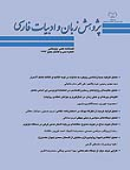انحلال هویت مداح در هویت ممدوح: مطالعهای بر پایۀ اشعار مدحی فرخی در دستگاه غزنوی
محورهای موضوعی : پژوهشهای ادبیات کلاسیک ایرانمحمدرضا تاجیک 1 , رضا زرینکمر 2 , مرتضی محسنی 3 , احمد غنیپور ملکشاه 4
1 - دانشگاه شهید بهشتی
2 - دانشگاه مازندران
3 - علوم انسانی و اجتماعی
4 - دانشگاه مازندران
کلید واژه: هویت دیگری مدح فرخی ممدوح در سایه,
چکیده مقاله :
در شعر مدحی، بر اثر آنچه منفعت مداح ایجاب می کند، هویت مداح در برابر هویت ممدوح رنگ می بازد و پسند و ناپسندهای مداح توسط ممدوح تعیین می شود. چنان که «ممدوحان در سایه» دیگر نیز تحت تأثیر خواست و ارادۀ ممدوح اصلی در معرض مدح یا ذم قرار می گیرند. در این نوشتار، رابطۀ مداح و ممدوح و انحلال هویت مداح در «من» ممدوح بررسی شده و نمونه ای تاریخی در این زمینه واکاوی شده است. نمونه ای از انحلال هویت مداح در هویت ممدوح را می توان در دوران حضور طولانی فرخی سیستانی در دربار غزنویان دید؛ دورانی که سلطان محمود بر دربار غزنین حکومت می کرد و در سایۀ ارتشی نیرومند، فتوحاتی پرشمار به کارنامۀ سلطنت خود افزود. فرخی در این دوران علاوه بر سلطان، «دیگران»ی را نیز مدح می کرد که روابط ادبی اش با آنان تابعی از ارادۀ سیاسی و خواست سلطان بود. نمونه ای از این نوع رابطه در برخورد فرخی با چرخۀ وزیران دولت غزنوی بررسی شده است. چرخۀ مورد نظر، عزل احمد حسن میمندی از صدارت سلطان، به وزارت رسیدن حسنک و جابه جایی مجدد حسنک با صدارت دوبارۀ احمد حسن است. فرخی در مدح این «ممدوحان در سایه»، از خود اختیار و هویتی ندارد و بر اساس اختیار «ممدوح اصلی» سخن می گوید.
In panegyric poem, as the panegyrist interest necessitates, the panegyrist identity fades away in the identity of the person who is praised. The panegyrist’s favor and disfavor are determined by the praised one’s, as “the other praised ones in shadow” are subject to the praise or blame under the influence of the will and wish of the main praised man. In this article the panegyrist and praised relationship, and dissolution of the panegyrist’s identity in the praised one’s is studied, and a historical sample is reviewed in this regard. One sample of the dissolution of the identity of panegyrist in the identity of the praised can be found during the long period that Farrokhi Sistani was in the Court of Ghaznavid during the rule of Sultan Mahmoud who could have lots of victories due to a very powerful army. During that period, Farrokhi praised not only the king but also “The others”, whose literary relationship with them was due to Sultan’s political will and wish. An example of this kind of relationship can be found in the way Farrokhi reacted to Ghaznavid cycle of ministers, which started by dismissal of the chancellor, Ahmad Hassan Meymandi, and substituting him with Hasanak, and again substituting Hasanak with Ahmad Hassan. In praising these “praised in shadow”, he does not have any personal choice or identity, and only speaks according to the “main praised” wills.
